
Published September 4, 2019
National Review - September 9, 2019 issue
Editor’s note: In the hurly-burly of politics, we usually don’t stop to note our simple, unadorned love of the things that make this country so marvelous. That’s what we’ve asked our contributors to our latest special issue, “What We Love about America,” to do.
Frank Capra’s movie Mr. Smith Goes to Washington came out in 1939. I, too, arrived in 1939, a couple of weeks after Hitler went into Poland. I was born in Philadelphia, where my father was a reporter for the Inquirer, but we moved to Washington after Pearl Harbor, when I was three, so that my father could cover the White House and Congress for the paper. We lived in a tiny attached house far across the Anacostia River, on Benning Road SE, hard by the Maryland line.
Sometimes on Saturdays my father took me and my brother Hughie down to the Capitol, where he had a desk in the Senate press gallery. Our treat was riding the open-air monorail subway back and forth to the Senate Office Building, savoring the tunnel’s subterranean wind. Afterward, we took a cab up Pennsylvania Avenue to the National Press Club, where Hughie and I would shoot pool and my father would drink Scotch-and-sodas with the troglodytes in the men’s bar.
When I was twelve and 13 years old, I worked summers as a Senate page boy, just after General Eisenhower became president. I sat on the steps of the rostrum, waiting for the snap of a senator’s fingers, and Vice President Richard Nixon sat in the presiding officer’s chair behind me, above my right shoulder — an earnest young man of Rotarian gravitas. Lyndon Johnson was the minority leader. I remember his gold cufflinks and beautiful shined cowboy boots. I brought him dishes of vanilla ice cream fetched from the Senate restaurant downstairs. William F. Knowland, the majority leader, sat across the aisle from Johnson, and I brought him little bottles of White Rock club soda from a cooler in the Republican cloakroom. (In 1974, ex-senator Knowland, heavily in debt, would commit suicide on the banks of the Russian River in California — an enigmatic American touch that seemed to me to refer back to Frank Capra’s movie.) Skinny John Kennedy of Massachusetts appeared now and then, on crutches. Joseph McCarthy of Wisconsin (shiny blue suits, black satchels under the eyes, a nervous little laugh — heh heh heh) was on the prowl. One morning an apple-cheeked, white-haired ex-president, Herbert Hoover, appeared at the back of the Senate chamber, and we all lined up to shake his hand.
My older brother Hugh and I, great walkers with energy to burn and no supervision whatever, set off from Georgetown on summer mornings — crossed Key Bridge into Arlington, which was in those days just a trolley turnaround on the edge of the old Confederacy, and walked downriver, recrossing the Potomac into D.C. by Memorial Bridge, thence to the Lincoln and Jefferson memorials and the Washington Monument (which we sometimes climbed to the top, all 898 steps, because it was there and because we could) and the Smithsonian, where we spent hours among the Americana and the exotic rocks and minerals. We were nine and ten years old but we had the freedom of the city.
When I return to Washington now, I feel a subconscious stirring of public stories and private meanings. The city is unrecognizable to me one minute, but in the next, it is the same as it always was: corrupt, yet sacred — a rascally and fallible and enchanted place: a city built low to the ground, spacious and full of trees and obscurely haunted. My father when talking about politicians — senators, presidents, it didn’t matter — almost unconsciously spoke in the voice of W. C. Fields, as if Washington were always to be understood as an immense hoax — a con. But it was also the home of gods, a private boyhood American Olympus.
— Lance Morrow, an essayist, is the Henry Grunwald Senior Fellow at the Ethics and Public Policy Center.








